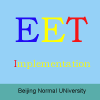-
Media literacy
普通类 -
- 支持
- 批判
- 提问
- 解释
- 补充
- 删除
-
-
Media literacy
WHOEVER CONTROLS THE MEDIA—the images—controls the culture," so said Allen Ginsberg. There may well be negative connotations to this statement. Nevertheless, media literacy is vital to communicating in tomorrow's world. Many of us do not understand the implicit messages in the media. As we enter into the 21st century we see the many advances in technology. As we make these advances, we do so with our sights set on meeting the requirements of being media literate.
According to David Considine, media literacy can be defined as the ability to access, analyze, evaluate and communicate information in a variety of formats. This means applying critical thinking skills to what we see, hear, and read. This is key to being fully literate in the information age. One medium that has taught us a lot is print. This medium can be either a newspaper or magazine. Magazines for example, are filled with ads that contain implicit messages. A media literate person will understand those implicit messages and will react accordingly to the truth and not the hype.-
Multimedia
Whether at work, home or school the media presents itself. The desktop has undergone major transformations in terms of the media applications it uses. There are audio and video components that are constantly being upgraded. Whether it is a ".wav file" or an ".html document" we are surrounded by 21st century media enhancements that are quickly replacing our color televisions and cd players. "How do we keep up?", and "who can keep up?" are questions that bombard us.
A good place to start would be San Diego State University. Take for example the Educational Technology students enrolled in graduate courses like Web-based Multimedia Development, Edtec 541 and Advanced Web-based Multimedia Development, Edtec 561. Both sets of students have had to demonstrate ways to create projects that utilize a variety of media—web, audio, video, print and/or film. Once the courses are completed, they will have acquired the skills necessary for producing information in a variety of fomats.-
Media Literacy in Schools
Our schools are the most logical places to begin implementing media education. Media campaigns (just like reading campaigns) will spread the importance of media literacy. Our teachers will find more and more creative ways to help students build critical thinking and analytical skills. In the end, there will be new opportunities for these students to put their media skills into practice..gif)
A function of media literacy-
The Media Literacy Movement
Beyond the classroom, one professional (DeBenedittis, 2003) sees a culture formed around humanity's hearts and desires, not manufactured by commercial greed. He believes because people will have access to the information, they will become empowered. Dr. DeBenedittis sees the media as a means of enhancing the lifestyles of those in the culture. According to his philosophy, citizens will see that media literacy aims to produce a society in which people will make informed choices and ultimately will have a more productive and lucrative way of life.-
More Information on Media Literacy
http://www1.medialiteracy.com/home.jsp
www.pbs.org/teachersource/media_lit/getting_started.shtm
www.medialiteracy.net-
Related EET Articles
Computer-based multimedia
Animation in literacy development
Newspapers as teaching tools
Digital natives in the classroom-
Author
Vanessa Williams , EDTEC Graduate Student
Williams, V. (2005). Media literacy. In B. Hoffman (Ed.), Encyclopedia of Educational Technology. -
-
- 标签:
- literacy
- students
- information
- media
-
加入的知识群:



学习元评论 (0条)
聪明如你,不妨在这 发表你的看法与心得 ~